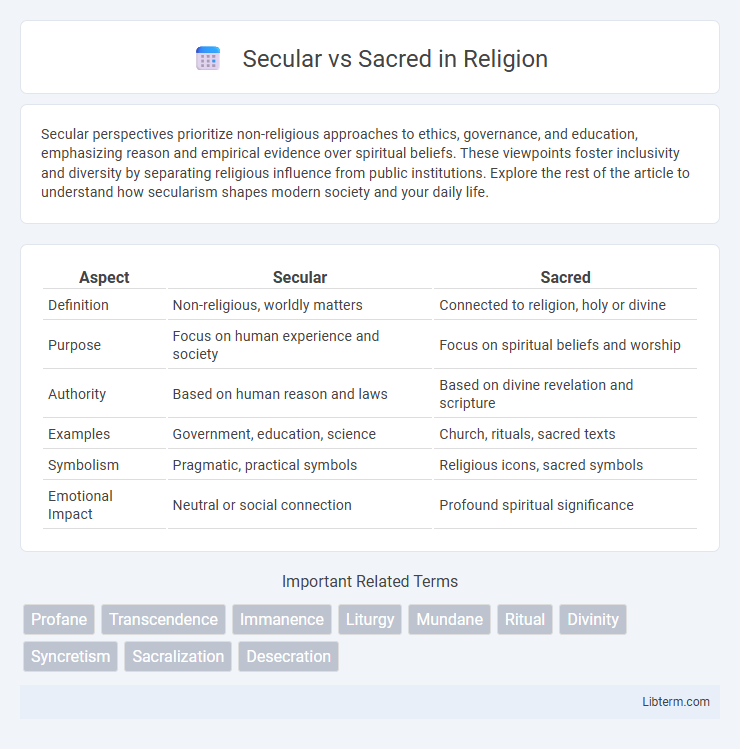Secular perspectives prioritize non-religious approaches to ethics, governance, and education, emphasizing reason and empirical evidence over spiritual beliefs. These viewpoints foster inclusivity and diversity by separating religious influence from public institutions. Explore the rest of the article to understand how secularism shapes modern society and your daily life.
Table of Comparison
| Aspect | Secular | Sacred |
|---|---|---|
| Definition | Non-religious, worldly matters | Connected to religion, holy or divine |
| Purpose | Focus on human experience and society | Focus on spiritual beliefs and worship |
| Authority | Based on human reason and laws | Based on divine revelation and scripture |
| Examples | Government, education, science | Church, rituals, sacred texts |
| Symbolism | Pragmatic, practical symbols | Religious icons, sacred symbols |
| Emotional Impact | Neutral or social connection | Profound spiritual significance |
Defining Secular and Sacred
Secular refers to concepts, activities, or institutions that are not connected to religious or spiritual matters, emphasizing a worldly or non-religious perspective. Sacred denotes that which is considered holy, divine, or spiritually significant, often associated with religious beliefs, rituals, and places of worship. The distinction between secular and sacred shapes cultural practices, legal systems, and personal identities across diverse societies.
Historical Contexts of Secular and Sacred
Historical contexts of secular and sacred arenas reveal distinct evolutions shaped by cultural and religious influences. The sacred often governed societal norms through divine authority and ritual practices in ancient civilizations and medieval periods, while secular spaces emerged prominently during the Enlightenment as a domain separate from religious institutions, emphasizing reason and human-centered governance. This divergence underpins the modern distinction where secularism promotes institutional neutrality, contrasting with sacred traditions rooted in spiritual and theological foundations.
Core Differences Between Secular and Sacred
Secular pertains to worldly, non-religious aspects of life, emphasizing rationality, science, and human experience, while sacred relates to the divine or spiritual realm, encompassing religious beliefs, rituals, and moral codes rooted in faith. The core difference lies in their source of authority: secular knowledge relies on empirical evidence and human reason, whereas sacred knowledge derives from spiritual doctrines and divine revelation. This distinction shapes cultural practices, legal systems, and individual worldviews by separating the tangible from the transcendent.
The Role of Religion in Sacred Spaces
Sacred spaces serve as physical manifestations of religious beliefs, rituals, and spiritual practices, often designed to evoke a sense of divine presence and community among worshippers. These areas are meticulously preserved and revered, reflecting the sanctity attributed to them by different faiths, contrasting with secular spaces that prioritize functionality and neutrality. The role of religion in sacred spaces extends beyond aesthetics, influencing social interaction, cultural identity, and the transmission of religious knowledge across generations.
Secularism in Modern Societies
Secularism in modern societies promotes the separation of religion from government institutions and public affairs, ensuring that laws and policies are based on rational, scientific, and inclusive principles rather than religious doctrines. This approach fosters pluralism, protects individual freedoms, and supports equal treatment of citizens regardless of their religious beliefs. Contemporary secular frameworks help maintain social cohesion by preventing religious conflicts and promoting neutrality in education, legislation, and public services.
Cultural Impacts of the Sacred vs Secular Divide
The sacred versus secular divide profoundly shapes cultural norms, influencing rituals, values, and social cohesion within communities. Sacred traditions often preserve identity and continuity through religious ceremonies and moral codes, while secular perspectives promote individual rights, scientific reasoning, and pluralism. This dynamic interplay fosters diverse cultural landscapes where spirituality and modernity coexist, sometimes causing tension but also driving social evolution and intercultural dialogue.
Sacred Practices in a Secular World
Sacred practices in a secular world serve as vital means for individuals to connect with transcendent values beyond material existence. These rituals, often rooted in religious traditions, provide structured spaces for reflection, community bonding, and spiritual renewal amidst the secular emphasis on scientific rationalism and everyday pragmatism. The coexistence of sacred practices within secular societies highlights the enduring human need for meaning, purpose, and ritualized expression.
Conflicts and Controversies: Secular vs Sacred
Conflicts between secular and sacred domains often arise over issues like education, law, and public policy, where religious beliefs may clash with secular values. Controversies include debates on prayer in public schools, reproductive rights, and the role of religious symbols in government spaces. These disputes highlight fundamental tensions between freedom of religion and the principle of state neutrality in diverse societies.
Blurring Boundaries: When Secular Becomes Sacred
The blurring boundaries between secular and sacred occur as cultural practices, rituals, and symbols traditionally considered secular gain spiritual significance, transforming into modern forms of sacred expression. Events like national holidays, music festivals, and sports often function as communal rituals, invoking collective identity and emotional transcendence that mirror sacred experiences. This convergence highlights how secular spaces and activities increasingly embody sacred meanings, reshaping societal perceptions of spirituality and devotion.
The Future of Secular and Sacred in Society
The future of secular and sacred dynamics in society will be shaped by ongoing shifts in cultural values and technological advancements influencing belief systems. Increasing globalization fosters interfaith dialogue and secularism, encouraging coexistence and mutual respect between religious traditions and non-religious worldviews. Societal trends toward individualism and scientific inquiry are likely to redefine sacred practices while promoting secular governance and pluralistic policies.
Secular Infographic

 libterm.com
libterm.com